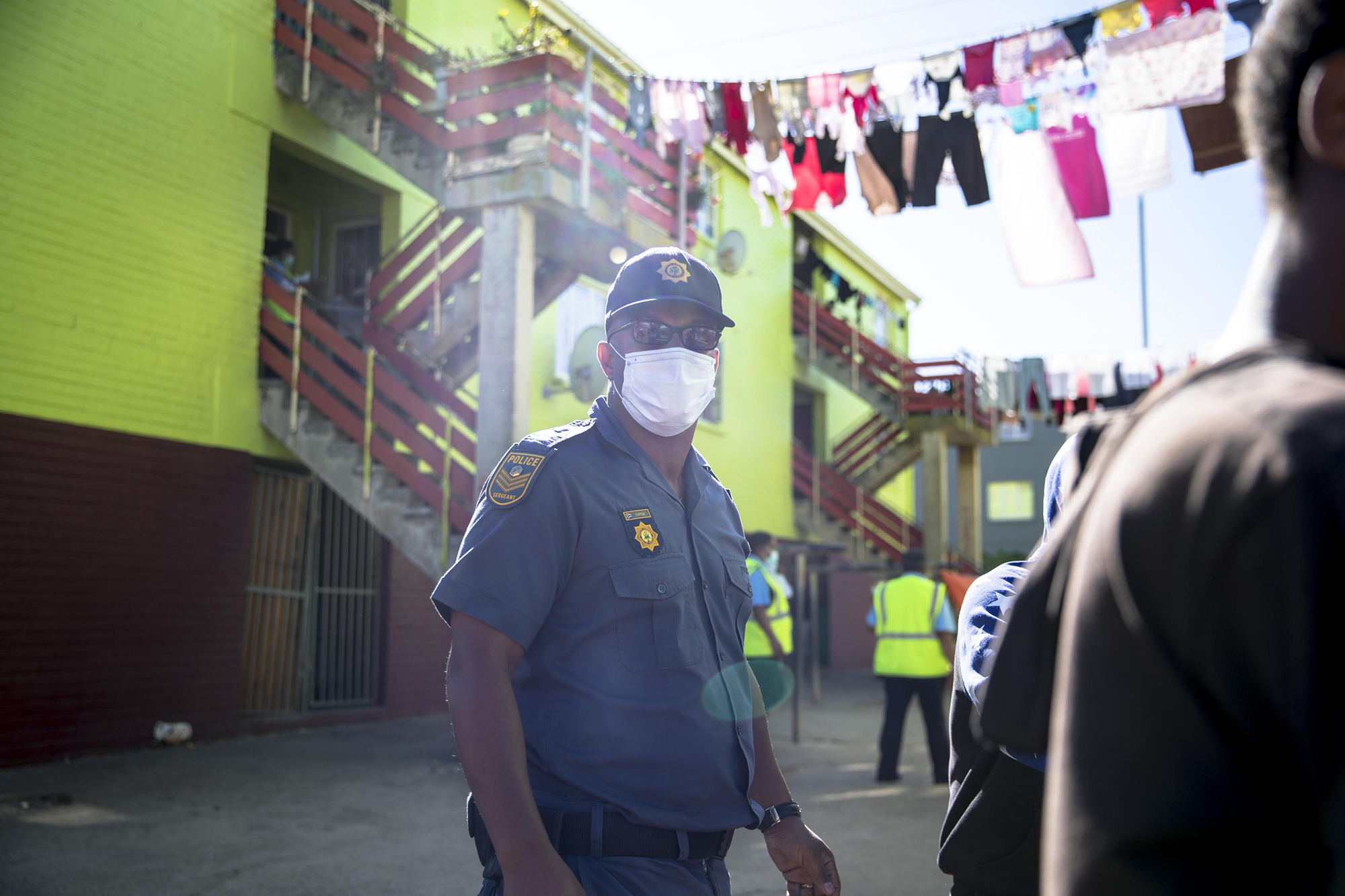
Life: Working, pivoting and surviving under lockdown in SA
by Alan Van GysenSouth Africans have endured two months of lockdown. These are challenging times and even more uncertain times lie ahead. How are people going about their daily lives? How are people surviving? Here are some snapshots from Cape Town.
‘As police, we meet people who have the virus, we’re at risk’
Sergeant Leon Fortuin, Zeekoevlei – Ocean View SAPS
Police and other law enforcement personnel, along with healthcare workers, are at high risk of exposure to Covid-19 on the frontline of the battle against this virus.
Standing outside “die blokke”, council flats in Ocean View in Cape Town’s deep south, Sergeant Leon Fortuin reflects on the “new normal” while giving Department of Health workers a hand and talking to residents about recent crimes in the area, including the theft of a bicycle at gunpoint that morning, as well as yet another shooting the day before.
“After seven weeks of lockdown, it is interesting to see how the three different communities that fall under Ocean View station have reacted to the restrictions. When we encountered some community members in Kommetjie, they were just worried about when they could go surfing again… they just wanted to be on the beach,” said Fortuin.
“In Ocean View, residents just wanted to know when they could buy cigarettes and alcohol again. And Masi… oh man, it’s like there has hardly ever been a lockdown there. The people are just up and down the roads all the time, so we’ve had to issue them a lot of fines, and that caused some conflict because they wanted to know why must they be confined to their homes. From their point of view, they live in a shack and you cannot have social distancing when three or four people are confined to such a small place.
“The real risk from a SAPS perspective, though, is seeing the number of Covid-19 (cases) rapidly increasing in Cape Town, and people, in general, being affected by the coronavirus. We’ve been working with the department of health, going through Ocean View and Masiphumelele, and assisting with the screening of residents.
“We’re trying to test as many as possible. Not many have gone for tests, but there have been some, and we are seeing more and more positive cases. Obviously, because we are meeting people who have the virus, we’re also at risk of exposure. I myself have gone for a test two weeks ago and it came back negative, so that’s good. No one at this station has contracted it yet, but two weeks ago a member of ours came into contact with someone who had tested positive for the virus, so we had to temporarily close the station for a few days so a specialised company could come in and spray the station,” said Fortuin.
“A normal Covid-19 day for us now, over and above our normal duties, includes our special briefing in the morning, then meeting and assisting the health department between 08:30 and 12:30 with door-to-door screenings, assisting people with permits… there are so many people wanting to cross provincial boundaries to the Eastern Cape for funerals. We have to do more roadblocks to check permits, and we need to search more premises. We confiscate a lot of cigarettes from spaza shops, which comes with a R1,000 fine.
“We’ve also had to assist law enforcement from the City of Cape Town and the Sheriff from Simons Town with evictions from flats where residents have not paid their rent for some years. I believe there was an instruction from government to ask landlords to please bear with their tenants during this difficult time, and to not evict people from their homes. I also have a place I am renting out and tenants couldn’t pay me, but ja… it’s one of those things and I understood their concerns and challenges, so I told them, it’s fine for now – we’re all going through hard times and they must just pay me what they can, when they can. It’s tough doing this kind of work, because as a person you really do feel compassion for people.”
‘I saw two trucks coming up through Ocean View, law enforcement vehicles, and I just knew’
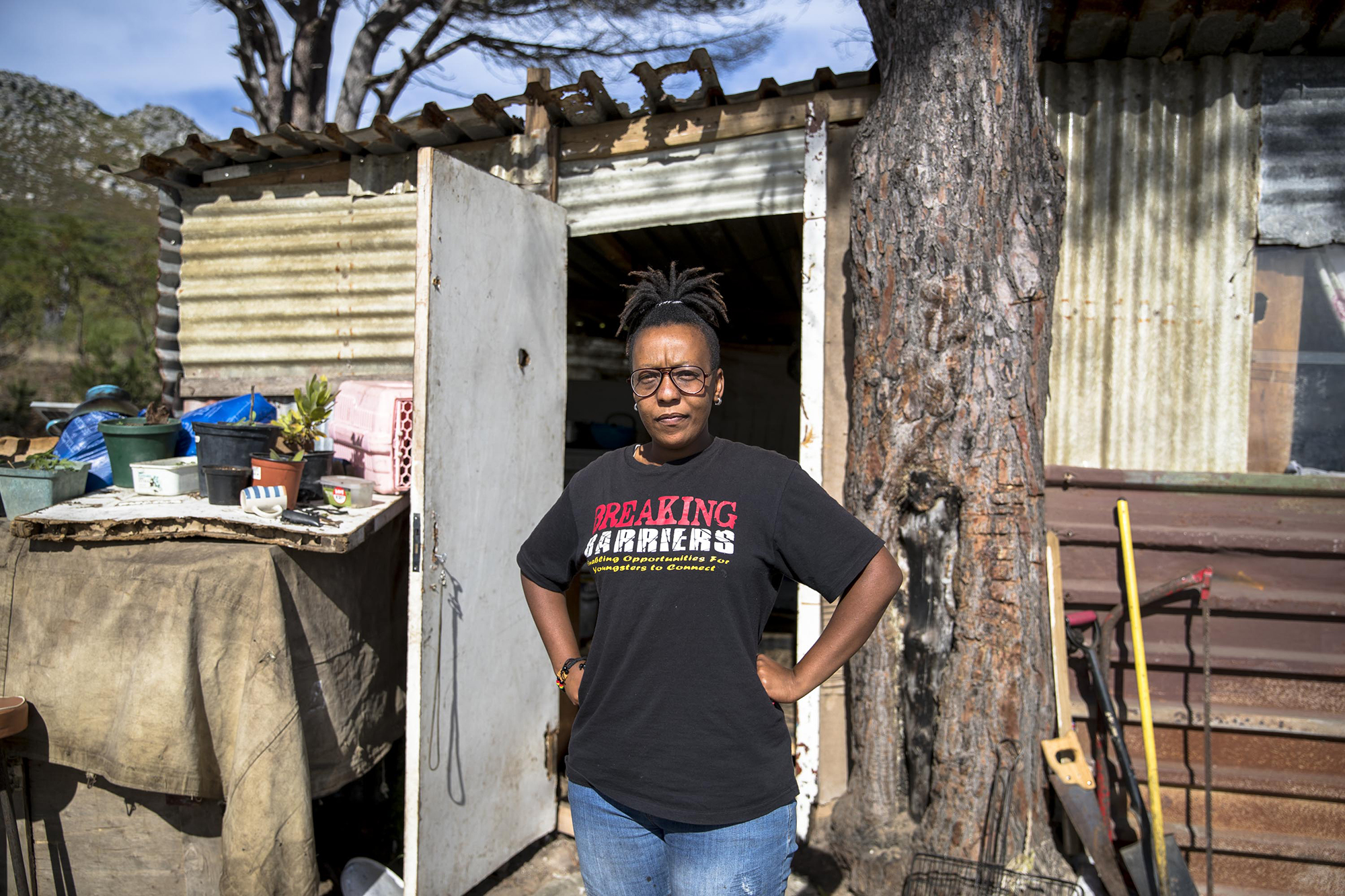
Bernadette “Bernie” Rossouw, 35, Ocean View – evicted resident
Above Ocean View lies a piece of undeveloped land on which numerous shacks have been erected over the past 16 years. The land was donated to the people of Ocean View for housing development by way of a trust, but after years of inactivity and no public participation on further plans for the land, the City of Cape Town arrived to evict people on 15 May. Among them were Bernie Rossouw and her three children.
“I have been living here since January after my third eviction left me homeless, but people have been occupying this land for years. The development trust covers 15.4 hectares of land and originally there were some plots available for R800 in Beverly Hills and R300 in Atlantic Heights, but those are all gone and Ocean View is as overcrowded as ever. People are living like sardines in a tin,” said Rossouw.
“The trustees are supposed to be the custodians of the land, but now they are trying to sell the land for R8-million to a private investor who apparently will subdivide the remaining land into properties to be sold for R1-million each. Who can afford that here in Ocean View? This land is supposed to be for low-cost housing. After hearing this, I occupied the land. I was born and raised in Ocean View. I fail to understand how this land is for sale and why our evictions are happening.
“A 78-year-old man and his wife live just down from me. Luckily they were home, so law enforcement couldn’t destroy their home and remove them. But the rest of us weren’t so lucky. If you aren’t occupying your home, they can tear it down and remove what they can. I saw two trucks coming up through Ocean View, law enforcement vehicles, and I just knew.
“I’ve experienced this too many times. I went down to them, tried to get a name or something, but they wouldn’t tell me anything. They didn’t have badges, I couldn’t see who they were because of their Covid-19 masks, and they had no form of documentation. They just told me to get out of the way and please leave the mountain because I was obstructing their duties. After that I stood at my door with my two-year-old in my arms and watched as they proceeded to take crowbars to our belongings and any unoccupied structure.
“My family is so traumatised. I stay here with my three youngest children. My eldest daughter ran away after my first eviction. That was brutal. Law enforcement held her down and pepper-sprayed her. I was at work and she was here alone. She is so traumatised that she won’t come back here. I don’t have anywhere else to go. Where must I go? I’m born and bred in Ocean View.
“If this land was just developed, I would buy an erf. I’m the chairperson of the Ocean View Backyard Dwellers and I can tell you that Ocean View has too many backyard dwellers… way too many. It’s just not on. I’m not leaving this place. I don’t have anywhere else to go. I’ve been on the City of Cape Town’s database for housing for about 16 years now – on the system, including the trust – but they have failed me and my children.
“Look at how I am living with my kids. My roof leaks. When it rains, I can’t sleep on my bed with my two-year old… this is me! The City is taking no ownership for what they are doing and not doing. I’m a South African citizen and we have a right to housing.
“It’s all the more difficult with Covid-19. There is no water here. How can I wash my hands? There are mornings when I can’t even brush my teeth or clean my daughter’s potty because I don’t have water. There are bigger struggles and issues in my life than worrying about catching Covid-19, to be honest. I am a single mother with no help. I work at a call centre in town.
“With Covid-19, I haven’t been able to work because schools and creches are closed, and I have nowhere to send my children. I don’t have parents – they died – so what do I do? I just want to live. I just want to provide a roof over my childrens’ heads, and a safe environment for them to grow up.”
‘All the guys on the boats are tested before going to sea’
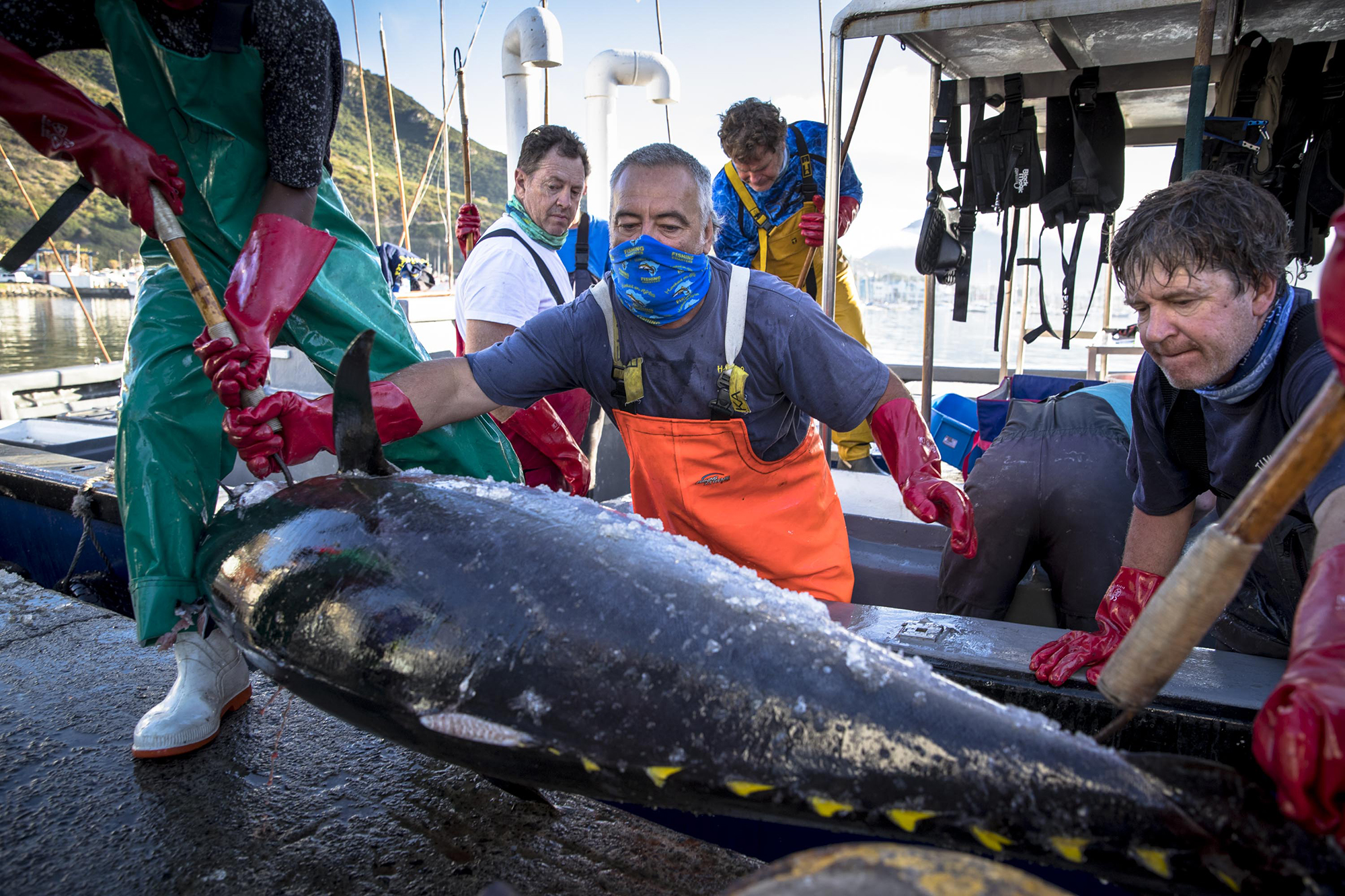
Grant Scholtz, 58, Newlands – charter boat skipper turned commercial fisherman
After three days and nights at sea, the tired and dishevelled crew of the Albatross make quick work of offloading their catch on the unusually quiet dock in Hout Bay harbour. The tuna are heavy, and it takes the collective effort of Grant Scholtz and five other crew to move, weigh and pack the fish into cold storage to be transported. This isn’t Scholtz’s regular work. Like many others around South Africa, he has had to get creative and find new ways to earn an income, and also help others where he can during the lockdown.
“I normally run fishing charters out of Hout Bay. Corporate and individual clients. Heading 40-50 nautical miles out to sea is very expensive, but we have clients who come six or seven times a year when the fish are here. This is actually one of the best times of year. This is when we usually have the big tuna competitions. Once lockdown happened, the bookings just dried up completely. Come the end of winter, I’m sure you’ll see many boats for sale. To survive and feed our families, some of the charter guys have found work on the commercial fishing boats,” said Scholtz.
“Due to the confined space, contracting the coronavirus is a risk, but all the guys on the boats are tested before going to sea. There was actually a suspected case just the other day. Someone was showing symptoms and the NSRI had to be dispatched to bring the vessel in, and everyone was quarantined. Fortunately, the tests came back negative, but it was good seeing people take it seriously and that there is a protocol in place.
“The fish we’re catching at the moment are yellowfin and longfin tuna. Longfin especially, as it can be frozen for canning. The yellowfin we don’t catch too much of, as the sushi market has dried up both locally with the closure of restaurants, and internationally for export because they can’t fly it out. With the lockdown restrictions in place, buyers have had to shift their business to local home deliveries just to stay alive and keep their staff supported. But it’s a completely different service and product. These businesses were set up for volume. Instead, they have had to change their model, train their staff to process and cut smaller quantities without waste, and move smaller boxes on the road. At the end of the day, guys are fishing and selling just to keep the wheels turning for everyone involved, from crew to staff.
“All the tuna caught out of Hout Bay is rod and reel or bamboo poles. No nets. When we find a shoal we take a couple of fish, not the entire shoal. This is sustainable fishing. If everyone was fishing with rod and reel, fish stocks globally would be healthier. Interestingly, our tuna industry is controlled by a global quota system, and not by any one government. We fall under the Atlantic Tuna Agreement. So they control and divide quotas up.
“It’s hard being out at sea for days on end. I come home now and I sleep for 24 hours. I’m not used to spending days out on the ocean. These ous who fish every single day are hard. A lot of the families who live in the local community work on, or are involved with, the commercial fishing boats. Some are skippers themselves and many are crew members. But not everyone can get on boats and, with the factories being closed due to lockdown, residents need to do something… so they catch fish off-the-books to feed their families. What else can they do? They’re caught between a rock and a hard place. I know what I would be doing if my back was against the wall like this,” said Scholtz.
‘I don’t think we will die from the virus, but we might die of hunger’
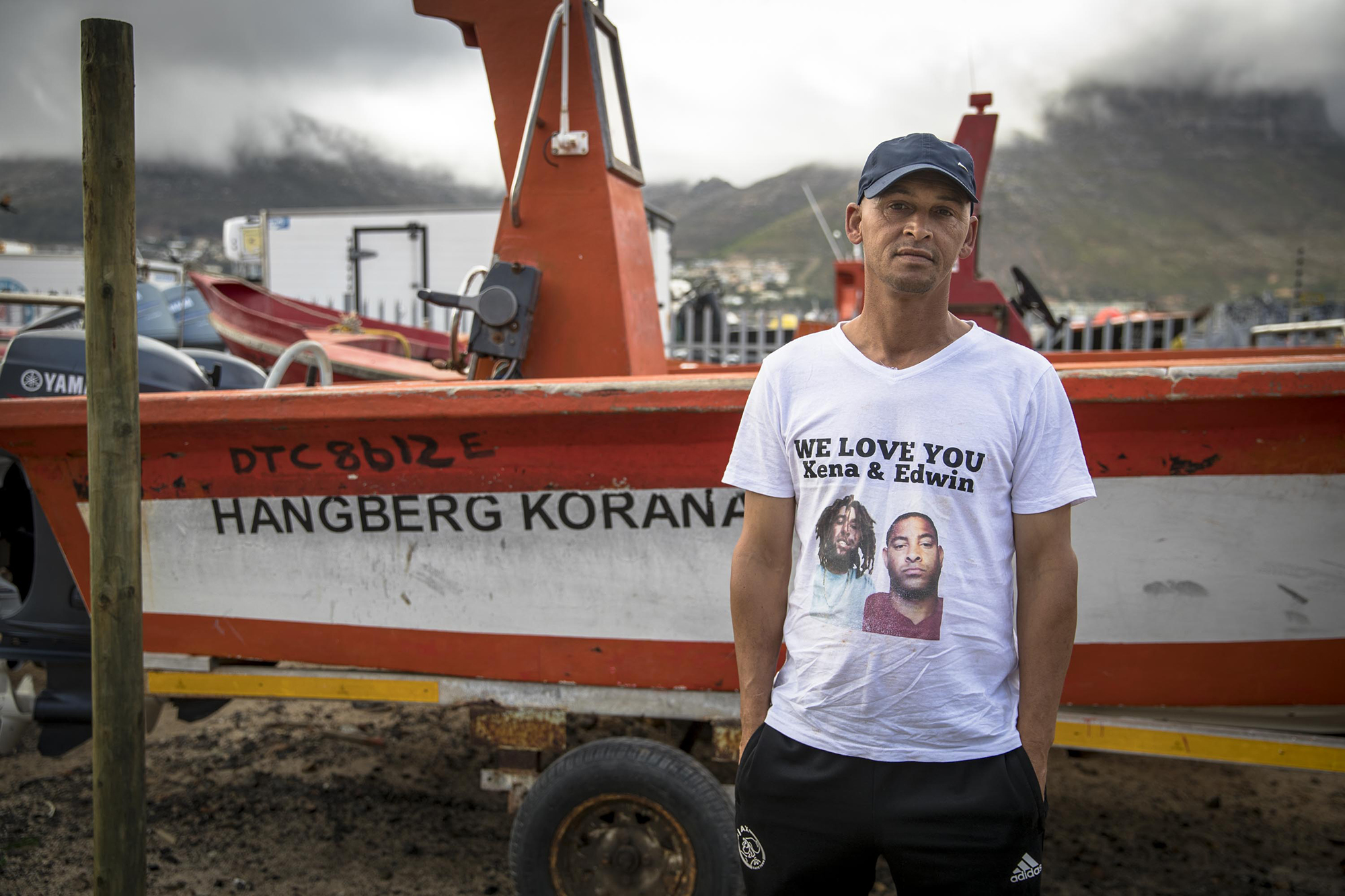
Angelo Joseph, 43, Hangberg, Hout Bay – community elder and construction worker turned subsistence fisherman
Water laps against the concrete dolosse skirting Hout Bay harbour, where Angelo Joseph sits and describes life under lockdown. The 43-year-old father of two was born and raised in the fishing village of Hangberg, which creeps up the mountain slope behind him. He can trace his family lineage across generations of fishermen and families who have lived off this same stretch of sea.
“At the moment people are struggling. There is no work and there is no income to buy food and basics. Those that aren’t getting food parcels have to turn to the sea. That’s what they have been doing for generations. It’s all they know. They know how to take a line, go to the water, catch a fish and feed their family. We have been doing this more than ever since the lockdown,” said Joseph.
“Some people have boats to go out to sea and catch, but those who don’t walk over the mountain and catch from the shore. I believe a minister gave permission for fishing on Wednesdays, but what if a Wednesday is wild and stormy? Do we go fishing and run the risk of being lost to the sea? Look at this T-shirt I am wearing… six people gone! Three from Hangberg and three from Mountain Pleasant in the Overberg. They were my bras! Their boat took on water, the pontoons didn’t want to inflate, and their batteries were stuffed. Another boat came to help but… people panic. Everyone jumped onto that boat and both boats went down near the 12 Apostles. So, we can’t just fish on one specific day. Fortunately, no one has been monitoring this side. When it’s a lekker day everyone wants to catch fish, and there are kids down there swimming and divers in the water. The guys are catching Hotties (Hottentot), crayfish, perlemoen… whatever they can get to feed their families for the day. They can’t sell it because no one is coming out to buy fish.
“But the big-time poachers, they’re playing Russian roulette. The moment they step onto those boats they know the chances of coming back from the sea at night or in bad weather are slim. And they can be caught by the authorities. I see the cops chasing them all the time. In the last month, more than 200 people got arrested and their boats confiscated. Or the sea claims you like my bras here. It’s a ticking time bomb. When you run with heavy guys like that, it’s not a matter of if, but when.
“Some of these boat owners got three boats. I was doing some work the other day and I heard this oke moaning about where they can store 10 tons of fish because the industry is closed. That’s just one boat in one night! And there are 15 boats going out sometimes! It’s hectic. Now, put that into monetary figures… it’s millions. Why can’t that boat owner buy some food and give it to the more vulnerable people? None of them is doing that, so I don’t feel fuck-all for them. But I do feel for the fishermen who step onto those boats to try and make some money to feed their family.
“I don’t think we will die from the virus. We might die of hunger. We have to do what we can and what we know. We have to catch fish, whether it is legal or not,” he said.
‘The alcohol ban has had a critical knock-on effect in South Africa’
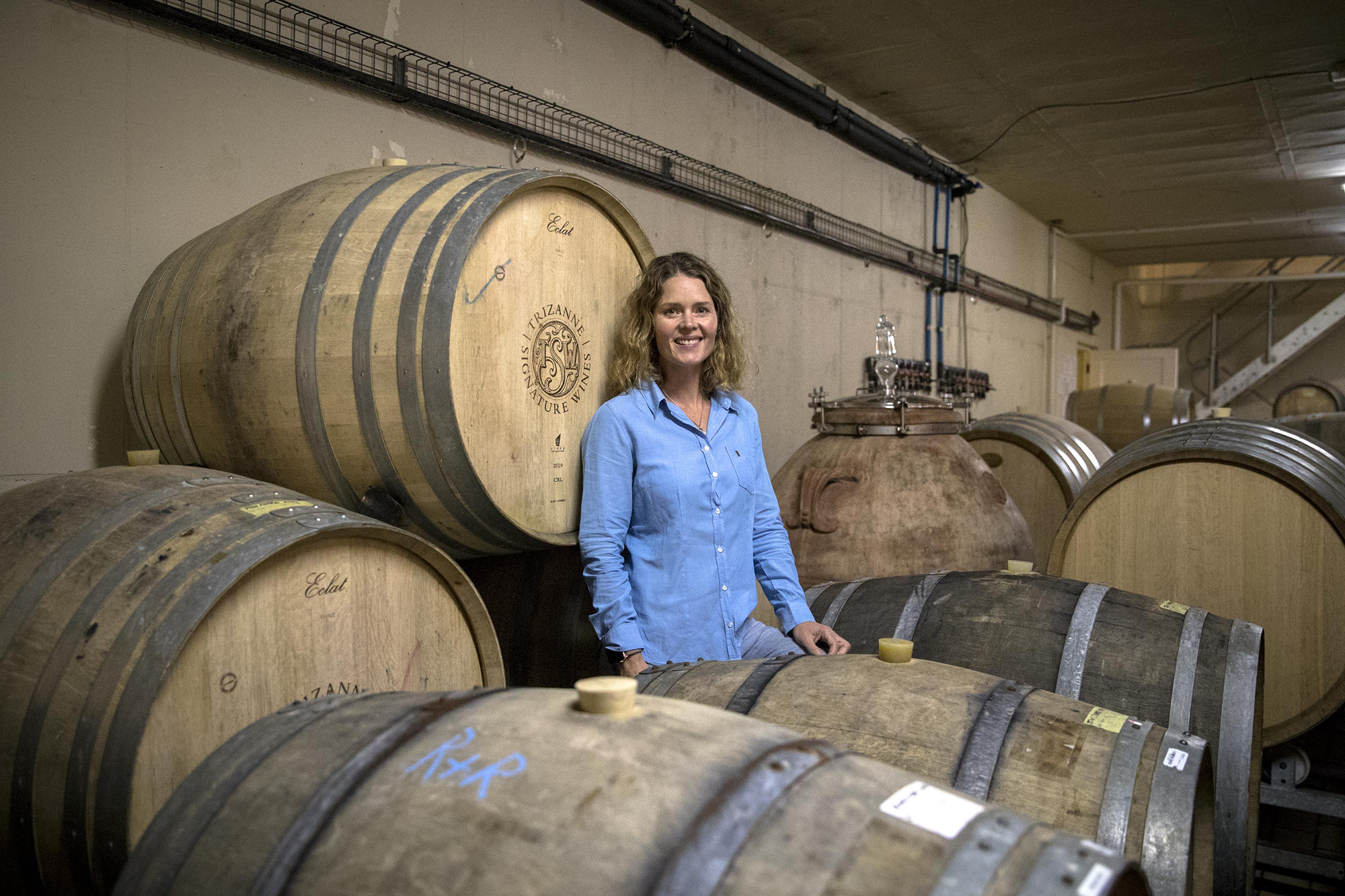
Trizanne Barnard, 41, Kommetjie – winemaker and local business owner
South Africa is famous for its wine, and the industry has long been a major contributor to the economy. According to SAWIS (SA Wine Industry Information and Systems), the industry brought in R36-billion last year and supports no fewer than 300,000 jobs. Trizanne Barnard is an award-winning winemaker, local businesswoman and mother of two. She spoke about the challenges facing her industry under the lockdown.
“When we entered lockdown it was extremely unclear within our industry what the laws and restrictions actually were, which was very concerning with 30% of our grapes still hanging. We were in the midst of harvest when lockdown was announced. At first, it appeared we weren’t allowed to finish the harvest due to the gathering of large picking teams. Fortunately we have two big bodies – Vinpro (a non-profit company which represents 2,500 South African wine producers, cellars and industry stakeholders) and Salba (South Africa Liquor Brand Association), who lobbied and got government to permit finishing the harvest,” said Barnard.
“The big thing for us, though, was that the on-trade and off-trade sales were banned, and in the beginning, exporting too. The wine industry employs 300,000 people and contributes 2% of South Africa’s GDP, so it’s quite a lot… and we don’t know how many jobs this could affect across the country. Vinpro continued to lobby government to allow exports as it made absolutely no sense to ban this in the first place. Government lifted the ban for one week in Level 5 which helped a lot, but then they closed things down again. Fortunately, once Level 4 came into effect, we were able to start exporting properly again, but as you know, local sales are still prohibited.
“This has such a critical knock-on effect in South Africa because the wine industry is completely intertwined with tourism, from restaurants to wine tourism, vineyard visits to wineries etc. There are just so many jobs affected. Fortunately for me personally, I haven’t been as hard hit as some because I export a lot of my wine, but there are others who rely solely on local trade, and they and their staff have been floored. It’s really sad to see how many wine farms are in distress and how many could be up for sale in the months to come.
“Regardless of what work we do, I think we all have to think a lot more creatively these days. I have had to rethink my e-commerce, how I communicate with my clients and even how to do my wine tastings virtually. It does have its upsides though, as we’re all connecting a lot more as a family. It is still a very concerning time though, and I worry a lot about the people around me. Friends and family, and those around in our communities… I wonder constantly if they are doing okay.”
‘There is no other way I can make money… all we can do is pray and wait’
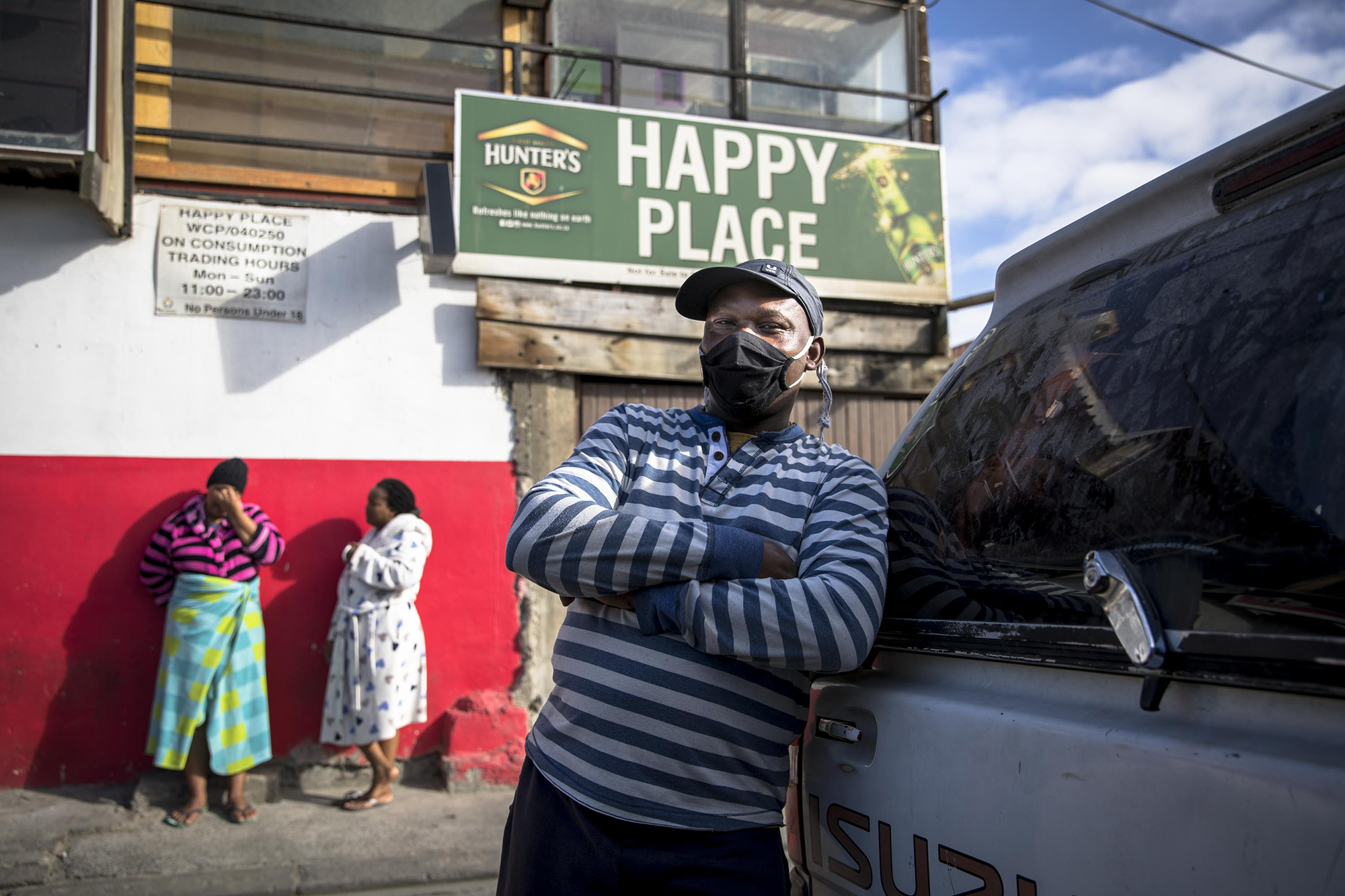
Andre Manuel, 39, Masiphumelele – tavern owner
Standing outside Happy Place tavern in a side street off the bustling main road of Masiphumelele, a few kilometres from Kommetjie and Ocean View, Andre Manuel helps his mother-in-law prepare the braai for the day – one of the only means of income for his family at present, while he talks about life as a local business owner, father and husband during this crisis.
“It’s difficult… it’s very difficult. And not just with business, but at home also. As a man you cannot just stay at home, and this is sometimes affecting our relationships with our wives also, you know. They are expecting that as husbands we will go out and come home with something – provide for the family. Now we’re not able to provide for anyone,” said Manuel.
“Other industries have been given a chance to open, but we don’t have this chance yet. We don’t even know when we will be able to open. Because we are in the Western Cape, we don’t know if we will be on Level 3 or stay on Level 4 and when we can trade… we just don’t know. And this is not only affecting me, it is also affecting my workers. I employ four people who work to provide for four other families. I’ve been able to help them with one month’s salary without work, but I cannot do it again. I just don’t have the money. And some of those people have been evicted because they could not pay rent… It’s terrible.
“Normally, when it’s not Covid-19 times, my licenced tavern is open 11:00 to 23:00. Not everyone who comes to the tavern comes to drink. Some come to enjoy sports on TV or to play pool. We receive many different types of people. You see, inside Masi, we are many different nations and peoples. Some, they want PSL soccer, but some, they want overseas matches. Some people don’t want to watch football at home alone. So they come here. Some buy cooldrinks. Some buy liquor. We try and cater for all our different people here.
“Right now, I am looking after seven people in my own family, including my in-laws who are old. I am financially responsible for seven. It’s embarrassing to admit, but my wife and her mother are having to help make us some money by selling braai meat on the street here – pork and chicken and things like that. But it’s not enough to keep us going, really. For you as a man, you are supposed to be a leader, to be strong. To back down and admit you cannot do your job is very painful. It hurts. I’m not able to do anything. My wife has to buy the electricity, and we don’t know when the water bill will come or if we can pay it. It’s a really big problem.
“Right now, there is no other way I can make money. It is difficult to travel, you cannot work on building sites, and you cannot find other work. And the police, they know I am a tavern owner so they drive past here many times a day. The bakkie that I use is well known by the police and people around here. I can do nothing. I cannot transport anything because I have been searched many times. They think maybe I am carrying liquor. I tried once to help an old lady who was sick to get to the hospital, and they stopped me and said I am not an ambulance and I cannot be doing this. So, there is no other way I can make money. Right now all we can do is pray and wait.” DM

Alan Van Gysen
Comments - share your knowledge and experience
Please note you must be a Maverick Insider to comment. Sign up here or sign in if you are already an Insider.